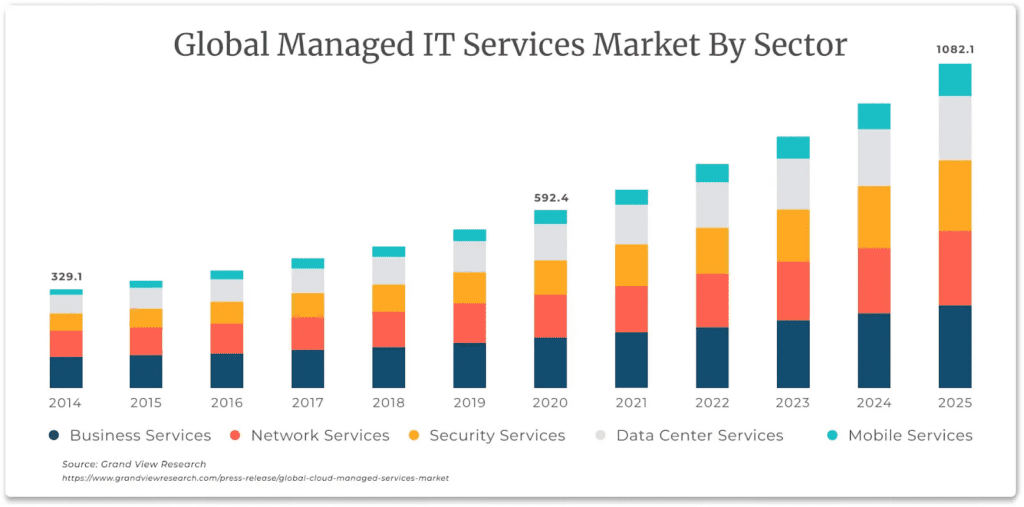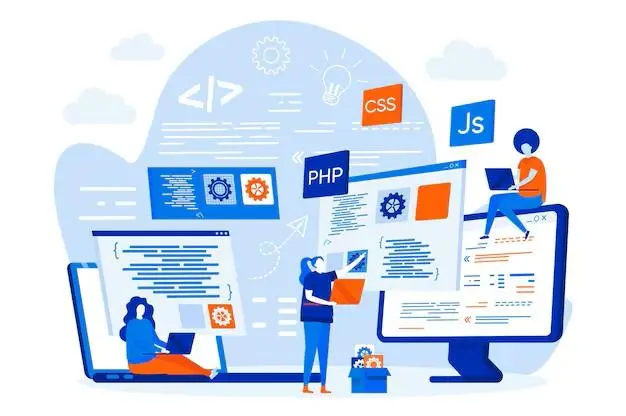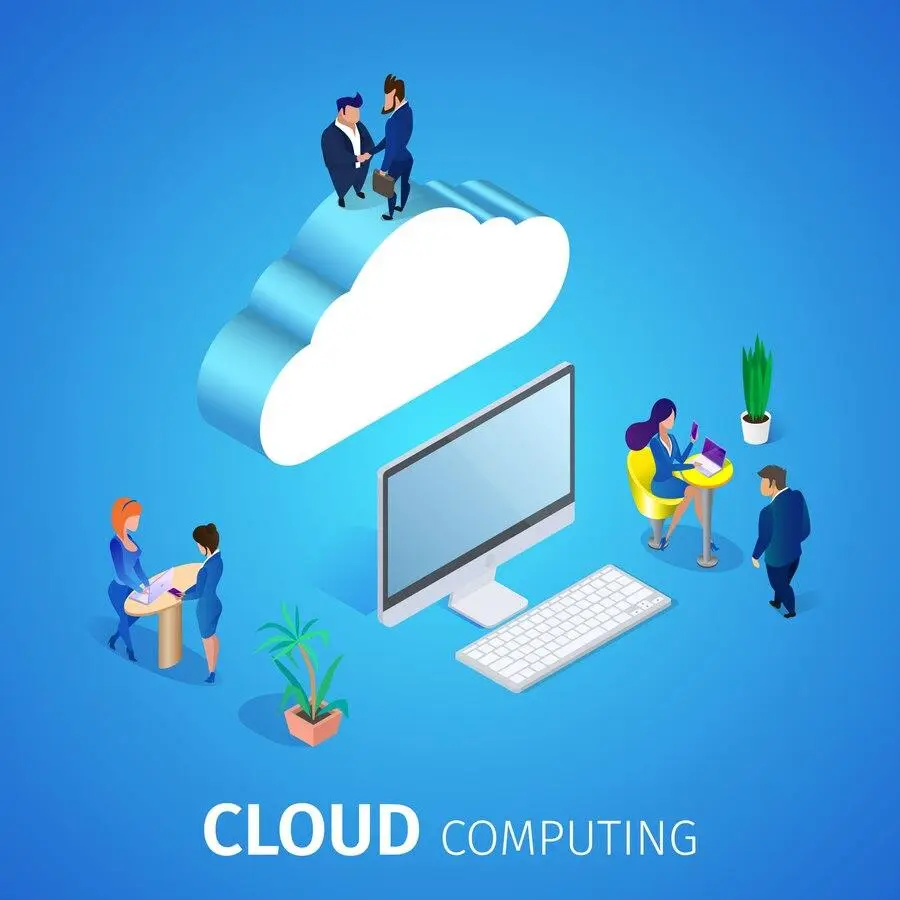Highlights
- In 2025, 60% of organizations will use managed IT solutions to reduce costs, improve efficiency, and enhance security.
- Managed IT solutions cover a range of services, including network monitoring, cybersecurity, data backup, software updates, and help desk support.
- Managed IT solutions offer cost savings, proactive monitoring and maintenance, scalability, enhanced security, and 24/7 support.
- MSPs utilize a variety of tools to manage and protect IT infrastructures effectively.
If your business experiences a critical system failure right before a major client presentation, panic sets in as you scramble to fix the issue, only to realize you don’t have the expertise or resources to handle it swiftly. This is where managed IT solutions come to the rescue.
Managed IT solutions are like having a dedicated team of tech experts on call, ensuring your systems run smoothly and efficiently.
In this blog post, we’ll discuss what managed IT solutions are, explore the different types available, and highlight the benefits they bring to your business.
What Are Managed IT Solutions?

Source: https://www.techbrain.com.au/benefits-managed-it-services/
Managed IT solutions mean hiring a Managed Service Provider (MSP) to handle various IT tasks. These tasks include network monitoring, cybersecurity, data backup and recovery, software updates, and help desk support.
By 2025, over 60% of organizations will use managed IT solutions to handle their IT needs. This shows how effective and reliable these services are at reducing costs, improving efficiency, and boosting security.
These services are usually offered through a subscription model. Also, clients pay a regular fee to access various IT support services. This setup provides predictable costs, scalability, and access to a skilled IT team without hiring more staff.
What are the Types of IT Management Solutions?

Source: https://thewebtier.com/what-are-the-types-of-it-solutions
Managed IT solutions cover many aspects of an organization’s IT setup. Here are ten(10) common types:
- Cybersecurity Services
Cybersecurity is crucial for businesses. Managed cybersecurity services include threat detection, vulnerability checks, security patches, firewall management, and incident response. Moreover, MSPs use advanced security tech and best practices to protect clients’ data and systems from cyber threats.
- IT Infrastructure Management
These services cover designing, deploying, optimizing, and managing IT infrastructure, including servers, storage, networking, and virtualization. MSPs ensure that IT components are configured correctly, perform well, and are secure and compliant with regulations.
- Network Monitoring and Management
This service involves monitoring a company’s network to spot and fix issues like downtime, slow performance, and security problems. MSPs use special tools to check real-time network traffic, device status, and security threats.
- Cloud Services
Cloud computing has changed how businesses manage IT resources. Managed cloud services include cloud migration, IaaS, PaaS, SaaS, cloud security, and management. Also, MSPs help businesses use cloud technology for better scalability, flexibility, and cost-efficiency.
- Managed Endpoint Security
With many devices connected to corporate networks, endpoint security is vital. Managed endpoint security services protect devices like desktops, laptops, smartphones, and tablets from malware, ransomware, phishing, and other threats. Also, MSPs deploy protection solutions, manage updates, and enforce security policies.
- Unified Communications and Collaboration (UCC)
Managed UCC services improve communication and collaboration among employees, customers, and partners. These services include VoIP, video conferencing, instant messaging, email, and collaboration tools. Moreover, MSPs design, implement, and support UCC solutions that fit seamlessly with existing IT setups.
- Data Backup and Disaster Recovery
These services ensure that essential data is safely and quickly restored if lost, corrupted, or affected by disasters like cyberattacks or hardware failures. MSPs use automated backups, redundant storage, and solid recovery plans to minimize downtime and protect data.
- Help Desk and Technical Support
Managed help desk services and provided technical support for IT issues and inquiries. MSPs offer remote support, onsite support, and 24/7 monitoring. Moreover, help desk services cover troubleshooting, software installations, account management, and user training.
- Managed Print Services
These services help businesses manage their printing operations and reduce costs. MSPs manage printers and copiers, optimize workflows, monitor usage, and handle maintenance and supplies.
- Compliance and Regulatory Services
Managed compliance services help companies meet regulatory requirements, implement security controls, conduct audits, and adhere to GDPR, HIPAA, PCI DSS, and SOX standards.
What are the Benefits of Managed IT Solutions?
IT service management solutions offer many benefits for businesses of all sizes and industries. Here are some key advantages:
- Cost Savings
Outsourcing IT functions to a service provider like Tambena Consulting can save money compared to managing an in-house IT department. Managed IT services usually follow a subscription-based model, which helps businesses predict and manage their IT expenses.
Moreover, this approach avoids costs related to hiring and training IT staff and investing in expensive infrastructure and technology upgrades.
- Proactive Monitoring and Maintenance
MSPs use advanced tools to continuously monitor a company’s IT infrastructure’s performance, security, and health. By detecting and fixing issues before they increase, MSPs can minimize downtime, prevent data loss, and optimize system performance, improving business productivity and efficiency.
- Scalability and Flexibility
Managed IT solutions are designed to scale with a business’s changing needs. MSPs can quickly adapt their services if a business is overgrowing, experiencing seasonal demand changes, or adjusting technology requirements.
Furthermore, MSPs offer flexible service plans and customizable solutions. This allows businesses to scale IT resources up or down as needed without additional costs or disruptions.
- Enhanced Security and Compliance
In today’s digital landscape, cybersecurity is a top priority for businesses. Managed IT services provide advanced security technologies and expertise to protect data and systems from cyber threats.
Moreover, MSPs use rigorous security protocols like firewalls, antivirus software, and intrusion detection systems. These protocols defend against threats and ensure compliance with industry standards and data privacy regulations.
- 24/7 Support and Monitoring
Managed IT services provide round-the-clock support and monitoring to ensure IT systems are always available and performing well. MSPs offer help desk support, remote troubleshooting, and onsite assistance as needed to address IT issues and minimize downtime.
IT Asset Management Solutions Tools
Managed Service Providers (MSPs) use various tools and software to effectively manage and support their clients’ IT infrastructure. Here are some common types of tools used by MSPs:
- Remote Monitoring and Management (RMM) Tools
RMM tools provide real-time insights into the health, performance, and security of endpoints, servers, networks, and other infrastructure components. Popular RMM tools include:
- ConnectWise Automate
- SolarWinds RMM
- Kaseya VSA
- NinjaRMM
- Professional Services Automation (PSA) Software
PSA software helps MSPs streamline their business operations, including ticketing, time tracking, billing, project management, and customer relationship management (CRM). Examples of PSA software include:
- ConnectWise Manage
- Autotask PSA
- Syncro
- Security Information and Event Management (SIEM) Solutions
SIEM solutions allow MSPs to gather, analyze, and link security event data from various sources to detect and resolve security threats. Moreover, SIEM tools provide real-time monitoring, threat intelligence, incident management, and compliance reporting capabilities. Popular SIEM solutions include:
- Splunk
- IBM QRadar
- LogRhythm
- Endpoint Protection Platforms (EPP)
EPP platforms provide comprehensive security solutions to protect endpoints such as desktops, laptops, servers, and mobile devices from malware and other cyber threats.
Examples of EPP platforms include:
- Bitdefender GravityZone
- Sophos Intercept X
- Trend Micro Worry-Free Services
- Backup and Disaster Recovery (BDR) Solutions
BDR solutions help MSPs ensure the continuity and availability of their clients’ critical data and systems in the event of data loss, corruption, or disaster.
Popular BDR solutions include:
- Veeam Backup & Replication
- Datto Backupify
- Acronis Cyber Backup
- Network Management Tools
Network management tools enable MSPs to monitor and manage their clients’ network infrastructure, including routers, switches, firewalls, and wireless access points.
Examples of network management tools include:
- SolarWinds Network Performance Monitor
- PRTG Network Monitor
- Cisco Meraki Dashboard
- Cloud Management Platforms
Cloud management platforms help MSPs oversee and control their clients’ cloud environments, including public, private, and hybrid clouds. These platforms provide centralized management, monitoring, automation, and governance capabilities across multiple cloud services and providers.
Popular cloud management platforms include:
- VMware Cloud Director
- Microsoft Azure Management Portal
- AWS Management Console
Are you looking for a trustworthy platform that offers top-notch Cloud Managed Services, Azure DevOps, and AWS DevOps solutions? Trust Tambena Consulting! We streamline your development processes, providing robust, scalable, and efficient solutions tailored to your needs. Contact us to experience the future of cloud computing and drive your business forward.
Final Words
Managed IT solutions offer a strategic advantage for businesses by providing comprehensive IT support and expertise tailored to their needs. With various services, from cybersecurity and network management to cloud solutions, businesses can benefit from reduced costs and improved operational efficiency. As the reliance on managed IT services continues to grow, partnering with a trusted Managed Service Provider (MSP) can help businesses stay ahead in the ever-evolving digital landscape.






